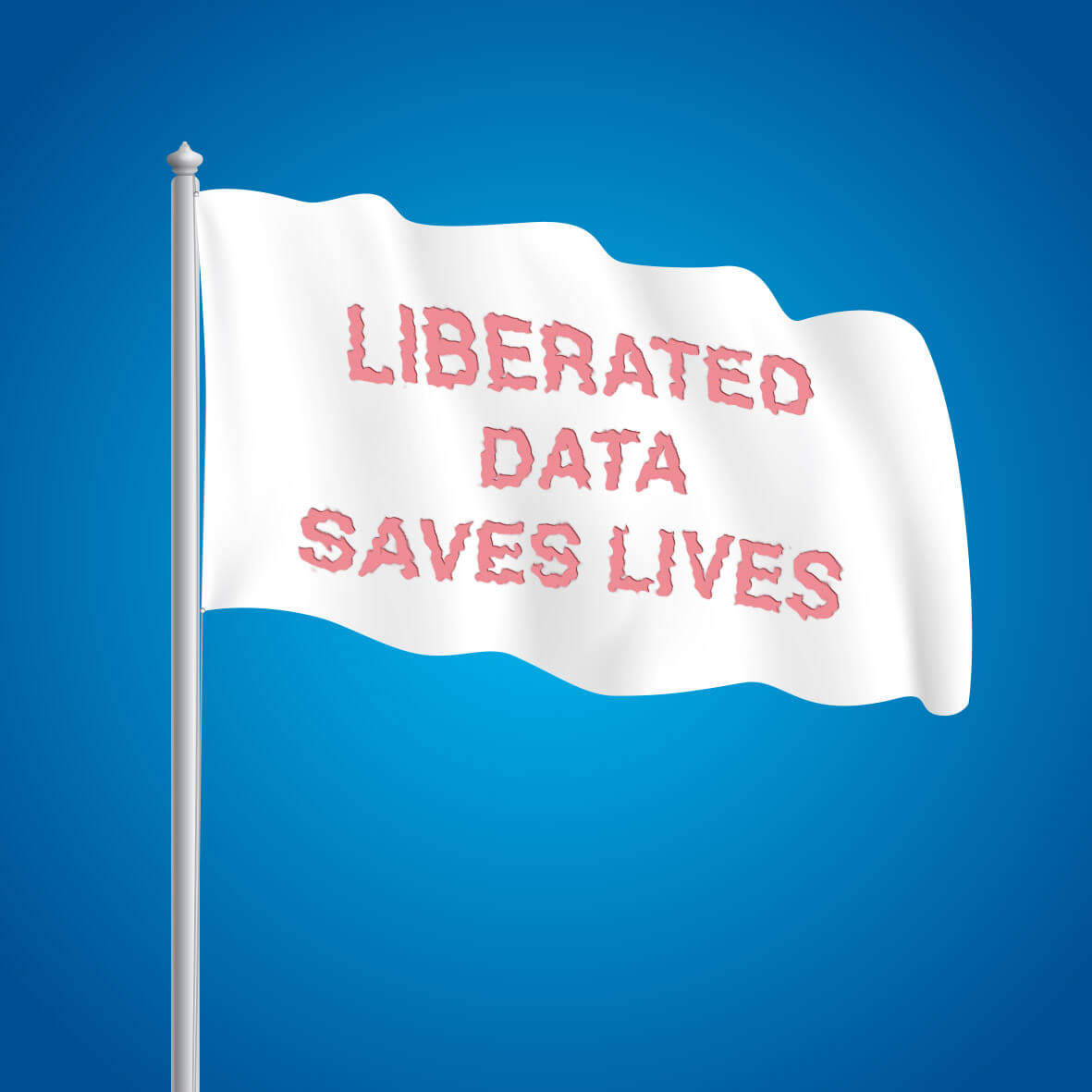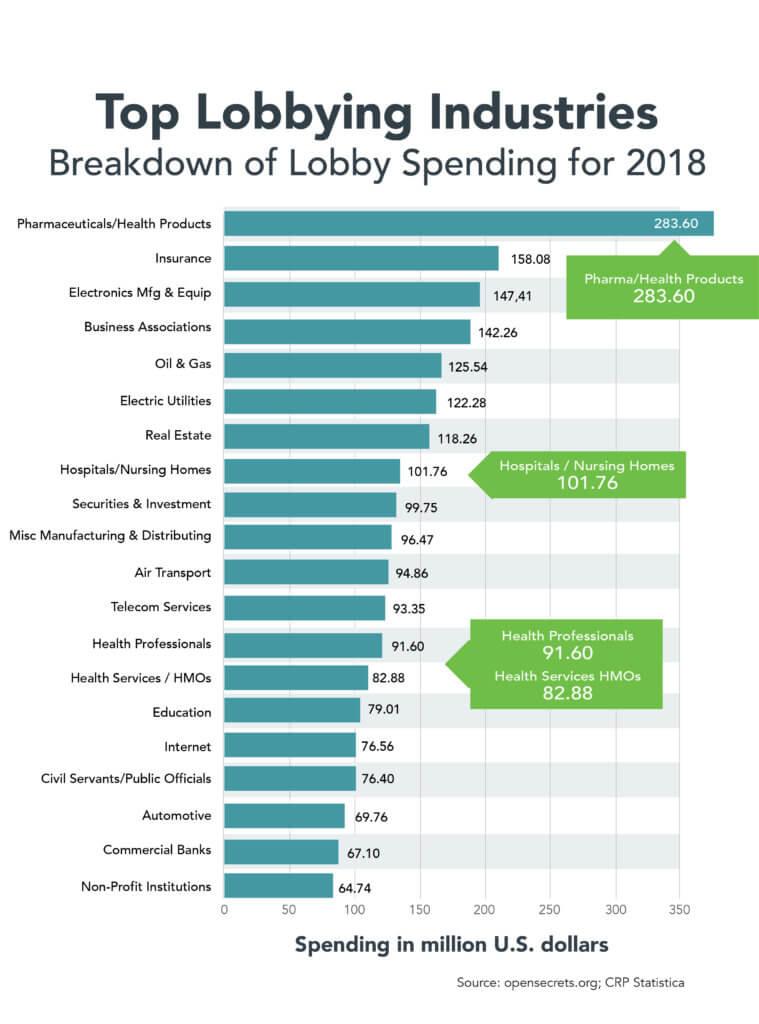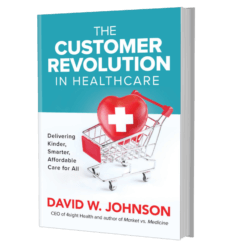October 8, 2019

Don’t Let Special Interests Block Pending Rules for Sharing Patient Healthcare Data
On September 23rd, the seven healthcare lobbyists listed below sent a letter to the leaders of the Senate Health, Education, Labor and Pensions Committee (HELP) and the House Committee on Energy and Commerce (E&C).
- American Health Information Management Association (AHIMA)
- American Medical Association (AMA)
- American Medical Informatics Association (AMIA)
- College of Healthcare Information Management Executives (CHIME)
- Federation of American Hospitals (FAH)
- Medical Group Management Association (MGMA) and
- Premier Inc.
In their letter, the lobbyists recommended that the federal government issue interim rules governing the exchange of patient healthcare data, rather than final rules. The HELP and E&C committees have oversight responsibility for implementing the 21st Century Cures Act (passed in 2016) that mandates data interoperability. The lobbyists’ obvious goal is to use their political muscle to influence the way our government regulates healthcare data.

These lobbyists claim to represent organizations that are “the foremost experts in in health informatics and health information management.” In making their recommendations, the lobbyists further claim their goal is to “foster a healthcare system that is interoperable, patient-engaged, and reduces burdens for those delivering the care.”
On the surface, the lobbyists’ motives appear laudable. They are not. The additional rulemaking, extended implementation timeframes and weaker enforcement mechanisms they propose would diminish the benefits that the new rules will create for healthcare consumers.
This letter is part of a massive industry campaign to delay, dilute and derail efforts by Office of the National Coordinator for Health Information Technology (ONC) and the Centers for Medicare and Medicaid Services (CMS) to modernize healthcare data exchange. ONC and CMS issued well-crafted rules in February to expand data interoperability (i.e. data exchange), reduce data blocking and grant patients easier access to their health data.
These pending regulations have already undergone a prolonged period of vigorous review. In an unprecedented demonstration of support, all six previous ONC leaders chronicled the benefits of the new rules in a June 4th Health Affairs article.
[We] unanimously believe that these rules have the potential to transform how information flows through our health care system, catalyzing broad innovation and engaging and empowering consumers.
We strongly support the proposed proactive measures for the acceleration of information exchange and interoperability, including the promotion of technical standards and the use of hospital conditions of participation.
We also applaud the proposed rule’s enforcement mechanisms against the use of pricing to restrict patients’ access to their health information and other types of information blocking.
Imprisoned Data Kills
While debating rules on sharing healthcare data may seem wonky and uninteresting, these rules have life and death consequences. A recent Leapfrog-sponsored study[1] by the Johns Hopkins Armstrong Institute for Patient Safety and Quality estimates that preventable hospital deaths in the United States number 161,250 each year.[2]
This is a remarkably high number of preventable deaths, almost five times higher than the number of people who die from car accidents. These unnecessary patient deaths often occur because clinicians cannot access vital patient data in real time at the point of care. Industry incumbents trap patient data in silos, making it impossible to get that data to the right place at the right time in the right format.
Far too often, providers and their electronic health record (EHR) vendors treat the organization of source patient data as proprietary. This prevents innovative companies from accessing it to create vital healthcare applications. Even worse, these organizations limit the ability of patients to access and understand their own healthcare data.
HHS is close to publishing the final rules in the Federal Register. As currently written, these rules will force incumbents to share healthcare data safely and expansively. The September 23rd letter represents a final push by lobbyists to shape the new rules in ways that benefit their members.

Government Capture Weakens Democracy
Healthcare is a massive, highly regulated $3.5 trillion industry. Given the government’s expansive role in healthcare, individual lobbyists pursue their members’ pieces of the gargantuan healthcare pie with a narrow and muscular laser focus.
Lobbyists generally cannot agree on the day of the week let alone policy recommendations. With regard to sharing patient data, however, the seven lobbyists referenced above are pushing in unison for adjustments to the pending ONC and CMS rules.
These seven lobbyists are not alone in peddling their influence on behalf of America’s bloated and avaricious Healthcare Industrial Complex® (the System). The System is essentially a full-employment act for lobbyists. In 2018, healthcare employed a third of all federal industry lobbyists and spent a whopping $560 million on influence peddling.
These figures exclude significant healthcare-related spending for lobbying by the non-profit and education sectors. Beyond federal lobbying, the System spends lavishly to influence state and local governments. This additional expenditure magnifies the System’s ability to capture control of governmental legislative and regulatory processes.

The not-surprising conclusion is that healthcare surpasses all other industries in its efforts to influence government policies at the federal, state and local levels. Lobbying works. The System generates a higher return walking the halls of nation’s legislatures and healthcare agencies than it does competing fairly in the marketplace. The chart details 2018 spending for lobbying the federal government by industry.
As currently configured, the System is hopelessly fragmented. It routinely overtreats, overpays, neglects preventive care, makes excessive medical errors, generates enormous waste and delivers suboptimal outcomes.
Lobbyists strive to perpetuate the System’s bill-first, care-second operating orientation. They riddle the design and delivery of U.S. healthcare with perverse incentives that benefit well-heeled industry incumbents at the expense of the American people and American society.
Widespread influence peddling is anti-democratic. The System’s capture of governmental decision making and enforcement weakens the fabric of American democracy. America isn’t America when special interests can tilt the competitive landscape.
It’s time for Americans to take back their healthcare. That is what ONC and CMS are endeavoring to do on behalf of the American people.
Liberated Data Saves Lives™
No rules are perfect, but these data-sharing rules are ready and necessary. They represent an important first step in creating fluidity for healthcare data. Until now, EHR vendors have shown little interest in advancing data exchange. The new rules require EHR companies to share data appropriately with third parties.
While the new rules establish meaningful guidelines for exchanging healthcare data, they are not set in stone. Going forward, HHS regulators can expand and adjust these rules to increase their effectiveness. A logical next step would require health insurers to provide access to their source claims data.
The time to implement ONC’s and CMS’s data-sharing regulations is now. Liberated data must flow to where it offers the most benefit. It will save lives. It will save money. It will make healthcare better.
Innovators by the thousands will develop cutting-edge applications. Their new apps will use protected patient data to advance healthcare delivery anywhere and everywhere. For example, apps will help frontline professionals make better real-time medical decisions and grant consumers easy access to their healthcare data.
ONC/CMS and the Healthcare Industrial Complex are fighting a pitched battle to determine whether healthcare data will flow freely. Our government must prevail. ONC’s and CMS’s pro-market reforms will unleash the American innovation machine on the System’s fragmented, value-destroying business practices. In the process, they will turn the System’s sacred cows into hamburger. They will let America be America.
Sources
- https://www.hospitalsafetygrade.org/media/file/Lives-Saved-White-Paper-FINAL.pdf
- https://crashstats.nhtsa.dot.gov/Api/Public/ViewPublication/812749
Outcomes Matter. Customers Count. Value Rules.
Join The Customer Revolution in Healthcare
Read about today’s revolutionary forces and leaders in The Customer Revolution in Healthcare, available for purchase on RevolutionaryHCare.com.






